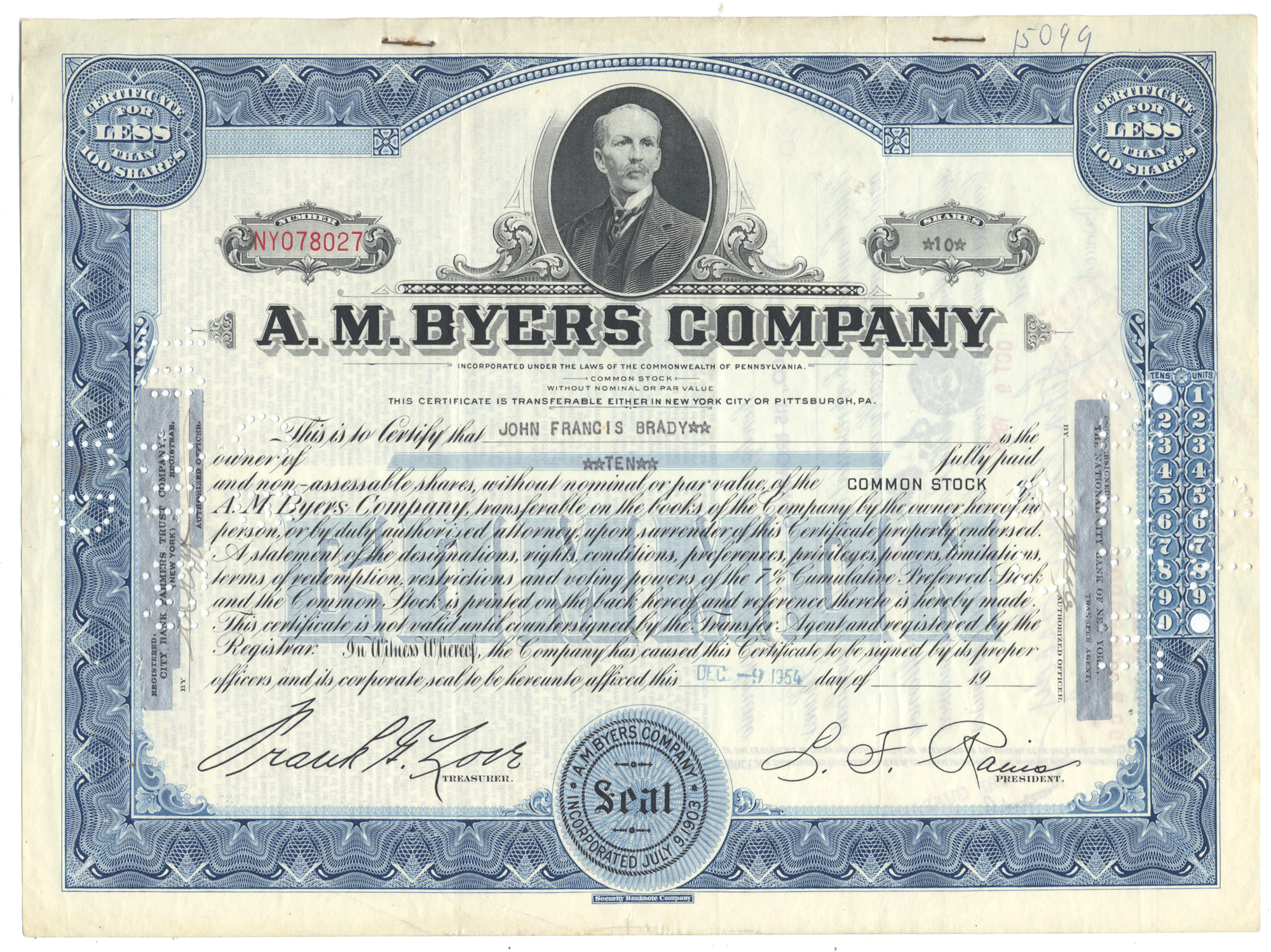Lehigh and Wilkes-Barre Coal Company
- Guaranteed authentic document
- Orders over $100 ship FREE to U. S. addresses
x
Product Details
| Company | Lehigh and Wilkes-Barre Coal Company |
| Certificate Type | Common Stock |
| Date Issued | 1920's |
| Canceled | Yes |
| Printer | American Bank Note Company |
| Signatures | Hand signed |
| Approximate Size |
11" (w) by 7" (h) |
|
Product Images |
Representative of the piece you will receive |
| Authentic | Yes |
| Additional Details | NA |
Historical Context
The Lehigh and Wilkes-Barre Coal Company (L&WB) was incorporated in Pennsylvania in 1874. It was formed by the consolidation of two existing companies: the Wilkes-Barre Coal and Iron Company and the Honey Brook Coal Company. The Central Railroad of New Jersey (CNJ) owned a controlling interest in the new corporation through the acquisition of a two-thirds majority of its capital stock.
On March 28, 1874, the L&WB entered into long term lease of the Lehigh Coal and Navigation's (LC&N) Carbon County Lehigh Mines. These properties, along with other controlled properties in Carbon, Luzerne, and Schuylkill Counties made the L&WB one of the largest corporations in Pennsylvania. During this period the L&WB controlled over 34,000 acres of coal lands having on them 37 slopes and 30 shafts, totaling 50 mine openings, that supplied 29 breakers. The LC&N lease required that an annual rent be paid equal to the sum of 21 percent of all coal mined from LC&N premises - based on Mauch Chunk prices - with a minimum rental of $500,000 paid in monthly installments. Tied to this lease was the stipulation that the CNJ had to operate and maintain the Lehigh Navigation for a rental of $50,000 per quarter ($200,000 per annum). If the CNJ fell in arrears for a period of 60 days, the LC&N could rescind its agreement with the L&WB. Having leased their mining interest to a railroad backed coal company, the navigation system would have otherwise been of no value to the LC&N. By tying the CNJ to the L&WB lease they had effectively insured the navigation system's continued use and upkeep. Also stipulated was the CNJ's lease of the Delaware Division Canal at $138,714 per annum.
However, the L&WB had expanded its operations beyond its ability to finance its debt. The downturn in business had pushed them over the edge of insolvency. If the LC&N forced a foreclosure it could start an avalanche of similar foreclosures. The CNJ owned the vast majority of L&WB capital stock, which they had pledged as collateral to finance their own expansion. If the L&WB crumbled, the CNJ would surely follow. Forcing the L&WB into receivership placed their many assets under the protection of the court. The court accepted the CNJ's plea and 3 Receivers13 were appointed on February 13, 1877, to administrate the financial affairs of the L&WB until such time that the company was again solvent. On June 23, 1877, the L&WB surrendered back LC&N properties. In what must have been heroic negotiations, the Receivers settled all accounts with the L&WB's creditors, and the company came out of receivership 22 months later.
Many decades later, in April 1920, the CNJ, along with other railroads who owned coal companies, was ordered by the United States Supreme Court to divest itself of the L&WB. This mandate from the nation's highest court was the direct result of earlier anti-trust action taken against the Reading Company, another Pennsylvania coal carrier/operator, for infringements of the Sherman Anti-/Trust Act and the Commodities Clause of the Hepburn Act. The CNJ complied with the court order and by 1921 was out of the coal mining business forever. This separation led to the L&WB to become a public company and issue stock under it's own name.
Related Collections
Additional Information
Certificates carry no value on any of today's financial indexes and no transfer of ownership is implied. All items offered are collectible in nature only. So, you can frame them, but you can't cash them in!
All of our pieces are original - we do not sell reproductions. If you ever find out that one of our pieces is not authentic, you may return it for a full refund of the purchase price and any associated shipping charges.








